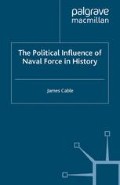Abstract
German philosophers are understandably inclined to pessimism. If the period 1919–39 covered by this chapter offers some remarkable exceptions to Hegel’s gloomy maxim, he might well have retorted that some of the lessons then learned later proved to have been misleading. In the early 1920s, for instance, one lesson very widely drawn from the history of the century’s first fourteen years was that `great armaments lead inevitably to war’.1 It was given early application in a proposal addressed in July 1921 by President Harding (1921–3) of the United States to the governments of Britain, France, Italy and Japan. Because the German High Seas Fleet had lain on the bottom of Scapa Flow since its scuttling on 21 June 1919, these four governments then represented the world’s leading naval powers and were invited to join the fifth, the United States, at a conference in Washington on the subject of naval limitation.
What experience and history teach is this — that people and governments never have learned anything from history, or acted on principles deduced from it (G.W. F. Hegel, 1770–1831, cited in Oxford Dictionary if of, Quotations, 1979).
Access this chapter
Tax calculation will be finalised at checkout
Purchases are for personal use only
Preview
Unable to display preview. Download preview PDF.
Notes and References
Viscount Grey of Fallodon, Twenty-Five Years: 1892–1916 (London: Hodder & Stoughton, 1925), p. 91.
J. Kenneth McDonald, ‘The Washington Conference’, in John B. Hattendorf and Robert S. Jordan (eds), Maritime Strategy and the Balance of Power (Basingstoke: Macmillan, 1989), p. 210.
Arthur J. Marder, Old Friends, New Enemies (Oxford University Press, 1981), p. 6. The Australian Prime Minister, Billy Hughes, supported the Anglo-Japanese Alliance at the Imperial Conference of 1921, but without success.
Correlli Barnett, Engage the Enemy More Closely (New York: W. W. Norton, 1991), p. 14.
Allan Nevins and Henry Steele Commager, America: The Story of a Free People (Oxford University Press, 1942), pp. 397–9.
James Cable, Gunboat Diplomacy 1919–1991, 3rd edn (Basingstoke: Macmillan, 1994), passim.
Stephen Roskill, Naval Policy Between the Wars (London: Collins, 1968), pp. 144–54.
Ibid., p. 154. Similar views emerge from the account by S. W. Page, The Formation of the Baltic States (Harvard University Press, 1959), passim.
Stephen E. Pelz, Race to Pearl Harbor (Harvard University Press, 1974), pp. 10–20.
W. G. Beasley, The Rise of Modem Japan (London: Weidenfeld & Nicolson, 1990), pp. 174–5.
Stephen Roskill, Naval Policy Between the Wars Vol. II (London: Collins, 1976), pp. 145, 149.
Alan Bullock, Hitler: A Study in Tyranny (London: Odhams, 1952), p. 294.
Paul Kennedy, The Rise and Fall of the Great Powers (London: Unwin Hyman, 1988), p. 296.
‘We shall march on, if all in ruins falls, for today Germany belongs to us, tomorrow the whole world.’ I am much indebted to Hans Wachter for his scholarly researches into the history of this song. It was originally written in 1932 for a Catholic youth movement. The text quoted incorporates in the second line the variant sung by the Hitlerjugend. When the author, Ober-leutnant Hans Baumann, included it in an anthology of marching songs he edited for the Oberkommando der Wehrmacht (GHQ German Armed Forces) — Morgen marschieren wir, 2nd edn (Potsdam: Ludwig Voggenreiter Verlag, 1940) — he stuck a little closer to his original text. It is interesting to note that, of the 200 odd songs he included, over 60 per cent could be classed as patriotic or militaristic and only 30 per cent were of the sentimental or ribald varieties preferred by British soldiers. Just four songs were identifiably Nazi.
Frank Hardie, The Abyssinian Crisis (London: B. T. Batsford, 1974), pp. 154–62.
Arthur J. Marder, From the Dardanelles to Oran (Oxford University Press, 1974), pp. 72–87.
Paul M. Kennedy, The Rise and Fall of British Naval Mastery (London: Allen Lane Penguin, 1976), p. 290.
James Cable, The Royal Navy and the Siege of Bilbao (Cambridge University Press, 1979), pp. 110–11.
‘Spanish neutrality is essential for us — our interest must always be, if it can be done, to detach Italy from the Axis’ (the term then employed to describe the informal alliance of Germany, Italy and Japan). Hervé Coutau-Begarie and Claude Huan, Darlan (Paris: Librairie Artheme Fayard, 1989), p. 145.
Lawrence R. Pratt, East of Malta, West of Suez (Cambridge University Press, 1975), p. 110.
Martin H. Brice, The Royal Navy and the Sino-Japanese Incident (London: Ian Allan, 1973), pp. 96, 89, 56–65.
HMSO, Fuehrer Conferences on Naval Affairs 1939–1945 (London: Greenhill, 1990), pp. 37–8.
Copyright information
© 1998 James Cable
About this chapter
Cite this chapter
Cable, J. (1998). Between Two Wars. In: The Political Influence of Naval Force in History. Palgrave Macmillan, London. https://doi.org/10.1057/9780333995037_10
Download citation
DOI: https://doi.org/10.1057/9780333995037_10
Publisher Name: Palgrave Macmillan, London
Print ISBN: 978-0-333-67170-2
Online ISBN: 978-0-333-99503-7
eBook Packages: Palgrave History CollectionHistory (R0)

